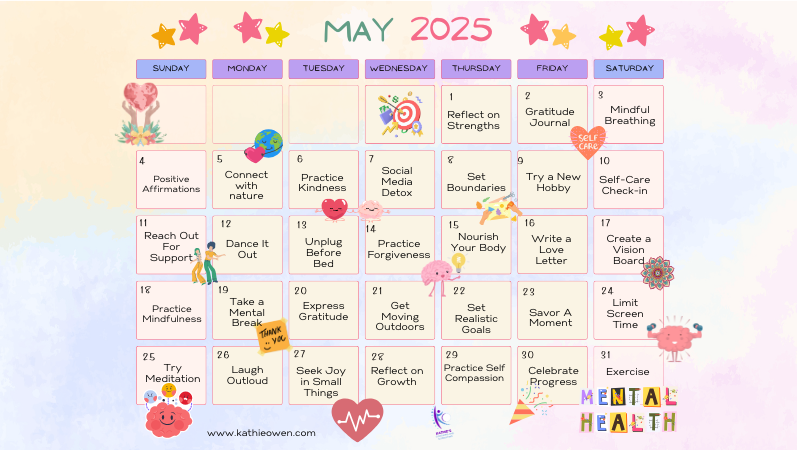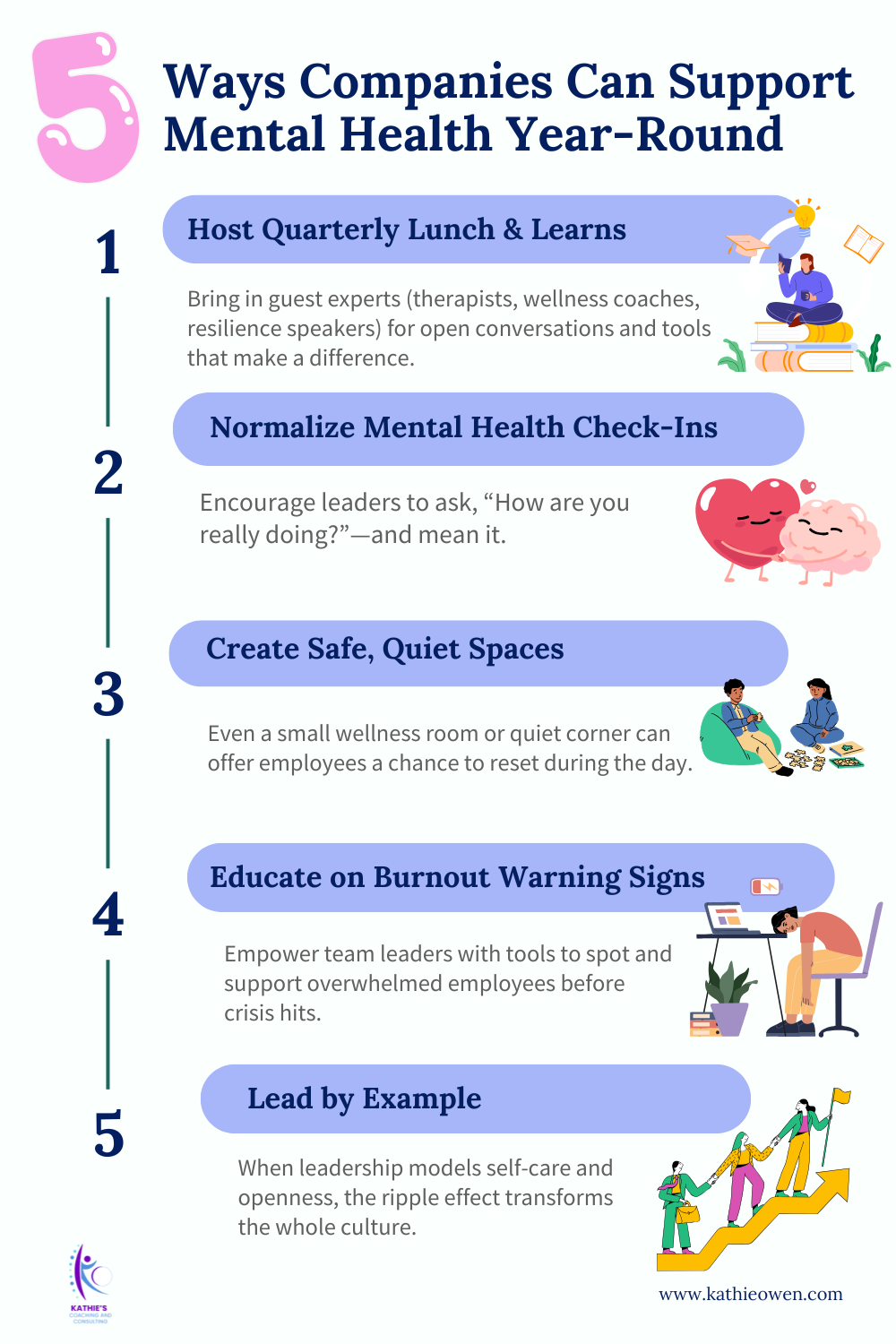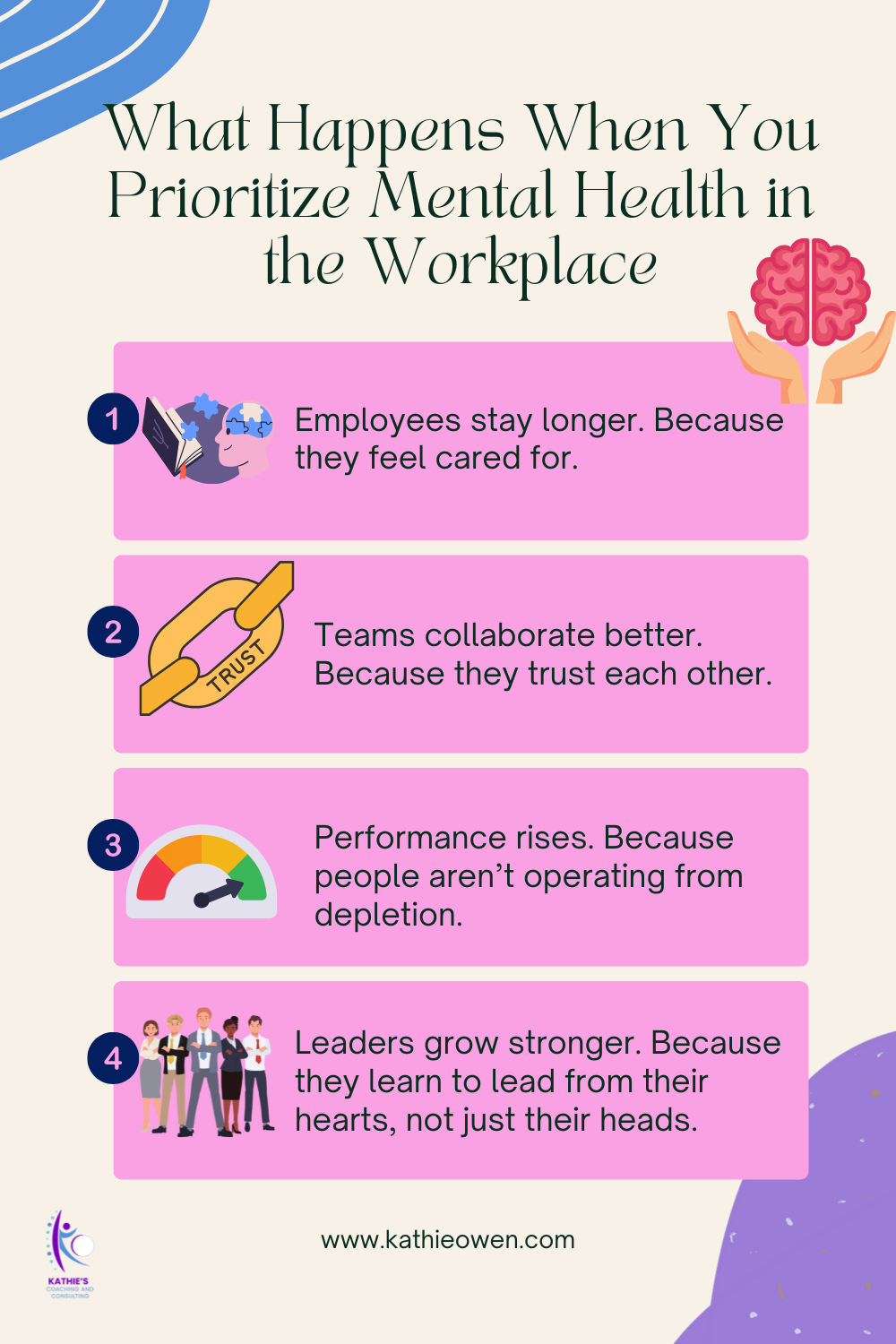Beyond Perks: Mental Health as Your Competitive Edge
Mental Health in the Workplace
Mental Health at Work Isn’t a Perk—It’s a Leadership Strategy
Let’s be honest: for too long, mental health in the workplace was seen as a personal problem. Something employees were expected to handle on their own, preferably outside of office hours, with a smile on their face and productivity intact.
But times have changed.
Now more than ever, companies are realizing that behind every high performer is a whole human—with a life, emotions, dreams, challenges, and yes, mental health needs that don’t stay behind at the door.
And when companies start acknowledging that truth?
That’s when everything changes.
Support Your Team’s Mental Health
A Post That Hit Home
I saw a post recently from a Houston-based company that stopped me mid-scroll. It wasn’t flashy. It wasn’t salesy. It was honest.
They shared how they support their employees’ mental health through quarterly Lunch and Learn sessions with local therapists, open dialogue, and a culture of real support—not just during Mental Health Awareness Month, but all year long.
I literally said out loud: “YES. More of this.”
Because this is the kind of leadership that changes lives.
And this is exactly the kind of work I’ve devoted my life to.
My Mental Health Story
My Mental Health Story (And Why It Fuels My Work)
In 2024, I lost my job.
After more than a decade of pouring my heart into building a wellness program that truly helped people, I was blindsided. The months that followed were filled with anxiety, grief, confusion, and waves of self-doubt I hadn’t felt in years.
The truth? It rocked me to my core.
But here’s what else happened: I healed. Slowly. Imperfectly. But beautifully.
I found my way through by leaning into the very things I teach.
💡 I joined Toastmasters in March 2025—and that community saved me. Standing up to share my story, even when my voice shook, helped me rebuild confidence, purpose, and connection.
💡 I also joined the Flow Based Prosperity Mastermind led by Joseph Rodrigues. If you know me, you know I’m deeply aligned with spiritual principles like Reality Transurfing and living from higher intention. Joseph’s guidance reminded me to detach from outcomes, trust the process, and speak from love—not fear.
Together, these two communities reignited my belief that well-being isn’t just personal—it’s professional.
Why Mental Health Belongs at Work
Let’s clear this up right now: supporting mental health at work doesn’t mean you’re turning your office into a therapy clinic.
It means you're creating a culture where:
People feel safe being human
Struggles aren't shamed or ignored
Rest and boundaries are respected
Leadership models vulnerability and care
When you build that kind of culture, you don’t just prevent burnout—you ignite engagement.
Your team feels more connected, more creative, and more committed.
In fact, according to the American Psychological Association, 81% of workers say they’ll look for workplaces that support mental health when they job hunt.
This is no longer a “nice to have.” It’s your competitive edge.
5 Ways Companies Can Support Mental Health in the Workplace
5 Ways Companies Can Support Mental Health Year-Round
Here’s what I’ve seen work with the companies I consult with—and what you can implement, no matter your team size:
1. Host Quarterly Lunch & Learns
Bring in outside experts to lead engaging sessions on stress management, resilience, mindfulness, or even financial wellness. These events show your team you care and give them actionable tools to improve their lives.
(And yes, I’d love to speak at one of yours!)
2. Normalize Mental Health Check-Ins
Train managers to ask real questions like “How are you feeling today?” and listen to the answers. Add mental health to your regular team discussions—not just when someone is struggling.
3. Designate Quiet Reset Spaces
You don’t need a fancy wellness room. A quiet office, break room, or even a corner with soft lighting and calming music can give employees a place to breathe during high-stress days.
4. Recognize the Signs of Burnout
Educate leadership on the symptoms of burnout—like fatigue, irritability, cynicism, or disengagement—and give them tools to respond with empathy and support.
5. Lead by Example
When leadership openly prioritizes mental health—by taking time off, sharing their own challenges, or modeling boundaries—it sends a powerful message that well-being is part of the job, not something you earn once everything else is done.
Prioritize Mental Health
What Happens When You Prioritize Wellness
Let me tell you what I’ve seen in companies who get this right:
Employees stay longer. Because they feel cared for.
Teams collaborate better. Because they trust each other.
Performance rises. Because people aren’t operating from depletion.
Leaders grow stronger. Because they learn to lead from their hearts, not just their heads.
And the best part? It’s not complicated.
It starts with a decision. A conversation. A commitment to do things differently.
We build healthy, happy teams one heart at a time!
The Power of One Heart
My personal mantra is:
We build healthy, happy teams one heart at a time.
That’s not just a catchy line—it’s the foundation of everything I do.
Because at the end of the day, we’re not just building businesses.
We’re building cultures. Relationships. Legacies.
So if you’re reading this and you’re in HR, or leadership, or simply someone who cares deeply about people—thank you.
You’re already part of the change.
And if you want to explore how we can work together to create a more supportive culture at your workplace, I’d love to chat.
Let’s Talk
💬 I speak at Lunch and Learns, lead wellness workshops, and design corporate wellness strategies tailored to your team.
💬 I also coach individuals on stress, burnout recovery, and building resilience from the inside out.
Book a free exploratory call —and let’s talk about what your team really needs.
Together, we’ll build something extraordinary.
About Kathie Owen
Kathie is a Corporate Wellness Consultant, Motivational Speaker, and Mindset Coach. With over two decades of experience in health and wellness, she helps companies and individuals reduce burnout, build resilience, and thrive.
She’s also the creator of the Better You Challenge and the host of Kathie’s Coaching Podcast.














During high-stakes mergers and acquisitions, leadership nervous systems determine outcomes more than spreadsheets do. Control, catastrophe, collapse, calm, and withdrawal are predictable human responses under pressure. Unexamined, they cost millions. Managed, they protect enterprise value and integration success.
#MergersAndAcquisitions #PostMergerIntegration #FounderRisk #HumanCapital #ExecutiveLeadership